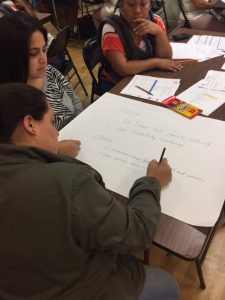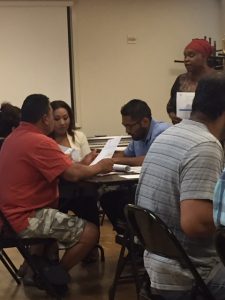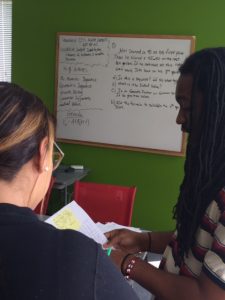First Oxford Day Academy Parent Center Meeting Focused on Building Community and Communications
By Martha Sessums, President, ACE
Who knew that the first half hour of the Oxford Day Academy (ODA)/ACE Parent Center meeting, would be a goal setting exercise? Small groups of parents sat at different tables and defined their goals as a parent group, wrote them on a large sheet of paper and presented them at the meeting. Sounds like school to me.
Teacher Ms. Michelle opened the Saturday, September 16 meeting explaining the goal setting assignment. “This is your vision of what you want your students and you as parents in this organization to look like,” she said. “What do you see this community becoming, how you can best work together and how can you, as a parent community, complete this goal?”
Dr. Irene St. Roseman, ODA Head of School and ACE Parent Center Director, stepped up to emphasize the importance of working together. “We are developing a team and cohesive group,” she said.
Ms. Michelle also emphasized the point as she indicated a parent who already had a child in college, “You are all a resource to each other,” she said. “This is what knowledge and community empowerment means.”
The 22 parents in attendance understood well. Their goal list included:
• Know each other as a community
• Lean on each other as resources
• Communications is key, including texts, emails and phone calls
• Attend these meetings – for our kids to succeed, all parents have to be here
• Provide alternative times for these meetings to meet all parent schedules
• Students need more help with homework
Whew. The classroom part was done.
On to announcements, which ranged from beginning to meet that request for help with homework, to partnerships with Stanford University and Cañada College, to defining the Field Experience that is key to ODA’s style of education.
In its first year, ODA has added extra focus on academic and social support. It offers special workshops to improve students’ skills in writing and math, and small group instruction three days a week in math, science and English. There is instruction on methods of learning including interacting and debating issues with teachers, a skill that is key in project-based instruction. ODA also actively provides support resources for special education, adolescence counseling, special needs and developmental issues.
Teachers of the cores of math, science and English gave overviews of their classes and a few students were on hand to explain their projects. Jules, a science student, explained how he was exploring evolution by studying “what horses looked like long ago and today.” His research resources ranged from books to Google searches.
The teachers also talked about the variety to instruction offered, with the goal of engaging students as they learned processes for organizing, analyzing and articulating their thoughts. It was not only the basics, but included art, design, film, debate, writing and other skills which will expand their experience and perspective.
Partnerships with Stanford University and Cañada College were announced. In October, Stanford Medical School will host workshops and observation of orthopedic surgery for students interested in exploring the medical profession. Cañada College is currently offering the class “Introduction to Philosophy” at ODA’s facility, and students will get a head start on earning college credits. In the future, students will go to Cañada’s campus to attend selected classes.
Dr. Mallory Dwinal, ODA Founder and CEO, gave a brief overview of the Field Experience the students had identified as their collaborative projects. They ranged from Bike Mobile to Social Media and Web Design. Through Oxford-style tutorials, the teachers will help students bring academic content to their service-focused projects.
The group session was over, and parents visited the teachers in their classrooms to discuss not only how their child was doing, but to see how and where they learned. The rooms were filled with tables, chairs and computers, and the walls hosted whiteboards with academic problems written on them.
I asked Mr. Sanders, the math teacher, what he found to be the student’s biggest challenge in Algebra, and his answer was “word problems.”
“They know the math,” he said. “It’s deconstructing the word problem that’s the challenge. It takes focus, but once the process is understood, they see the real-life application of these problems. Plus, by the time they take their college entrance exams, they will recognize and know how to solve all the problems.”
The ODA parents received a good taste of the project-based learning their children receive on a daily basis at the parent meeting. Their start was collaborative-based, and the end was finding knowledge by asking lots of questions. I suspect many walked away better able to understand and support community empowerment. Next month’s ACE Parent Center meeting will probably include more parents and be even stronger.



